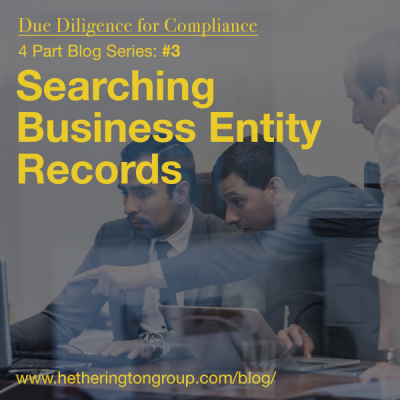By Cynthia Hetherington
 This past year has brought about a great deal of change in due diligence requirements for compliance regulations. The Committee on Foreign Investment in the United States (CFIUS) saw the Foreign Investment Risk Review Modernization Act of 2018 (FIRRMA) signed into law. CFIUS and FIRRMA didn’t capture as much attention as the European Union’s GDPR, but the impact on U.S. businesses is significantly more involved for open source investigators.
This past year has brought about a great deal of change in due diligence requirements for compliance regulations. The Committee on Foreign Investment in the United States (CFIUS) saw the Foreign Investment Risk Review Modernization Act of 2018 (FIRRMA) signed into law. CFIUS and FIRRMA didn’t capture as much attention as the European Union’s GDPR, but the impact on U.S. businesses is significantly more involved for open source investigators.
Our research efforts deconstruct foreign investors to address the “growing national security concerns over foreign exploitation of certain investment structures” who are investing into U.S.-based interests. If the investors don’t qualify, they will lose their opportunity. This work brings the best of what we investigators do into clear focus, as it requires expert due diligence efforts for national security. This is not the only due diligence requirement; states also have their own requirements.
In this 4-part series, we provide information on banks and financial institutions, business entities, non-profits, and franchises, so that when you conduct due diligence for your clients, you know you’re dotting all the i’s and crossing all the t’s. This week, we review key searches for business entity records.
Searching Business Entity Records
Searching for a business entity’s records starts with a record index. An index hit will lead to a document file number or images of documents. Most states provide a centralized index of all their registered business entities (corporations, partnerships, LLCs, LLPs, etc.) and usually this index is searchable online.
Good researchers must become familiar with the alphabetizing system in use: On-site or online. Keeping the following questions and tips in mind are crucial to a thorough search on any system:
- When a company name starts with “The,” should you search for The ABC Company or search by ABC Company?
- When a company name starts with a number, is the number alphabetized as a word? Are listings with numbers found at the front or the end of the index?
- Watch for key words indicating name changes, former entities, or related companies. If a company is known as YESS Embroidery and Screenprinting, it would be worthwhile to search for YESS Embroidery, YESS Screenprinting, YESS Screenprinting and Embroidery, The YESS Company, etc. Also, ascertain if the use of an “&” in place of the word “and” will modify the search results.
- Know the capacity for error and forgiving of typos. If you can pull an alphabetical index list, make sure that screenprinting is not listed as screnprinting [sic] or even screen printing, etc.
- Many large companies with offices or clients in multiple states will incorporate in Delaware or Nevada.
Information found in a registration file typically includes the date of registration, status, name and address of the registered agent, and, sometimes, the names and addresses of officers, directors, or principals. The registered agent is the person authorized to receive legal papers such as service of process. The registered agent can be a company attorney, a principal, or a designated third party who specializes in representing business entities.
The registration file can hold myriad other company documents. For example, a corporation registration file will typically include the articles of incorporation, annual reports, merger documents, name changes, and termination papers. Partnership and LLC filings may include similar documents with details such as how decisions are made, how profits are distributed, and names and addresses of all limited and general partners or owners. Finding this material is a good way to find the affiliates of a search subject.
All state agencies provide a business name check so that a new entity can make sure the name is not already used by an existing business entity. Many offer this service online. Performing a business name check is often a good way to find where a business is located and may lead to additional information about a business.
Checking to see if a company is currently registered and if filings are current is called a status check. If an entity’s registration is current and there are no problems, a document known as a Good Standing may be purchased. If available, articles of incorporation, including amendments as well as copies of annual reports, also may provide useful information about an entity or business owner. It is important to note that corporate records may not be a good source for a business address because most states allow corporations to use a registered agent (third party) as the address for service of process.
Using a Company’s Website as a Resource
Do not underestimate the usefulness of news stories, press releases, and other data displayed on a company’s website. The About Us section may accurately offer company history and ownership information. However, it is best to verify any company-produced literature. Given that investigators always verify their leads, take a look to see what is on the website that may offer clues.
Next week, we continue our examination of due diligence investigations with a discussion of how to search non-profits and franchises.

Are you an analyst or investigator looking for advanced training on enhanced due diligence compliance? If so, check out Hg’s webinar series, where you can attend live sessions and receive CEUs or watch previously recorded sessions to beef up your OSINT skills.
 In today’s global marketplace, investors are faced with multi-national compliance regulations. As veteran investigators in enhanced due diligence, Hetherington Group understands the business world and the legal and regulatory frameworks in which corporations and privately held companies operate. Learn how our team can help you mitigate risk at home and abroad.
In today’s global marketplace, investors are faced with multi-national compliance regulations. As veteran investigators in enhanced due diligence, Hetherington Group understands the business world and the legal and regulatory frameworks in which corporations and privately held companies operate. Learn how our team can help you mitigate risk at home and abroad.
 Cynthia Hetherington, MLS, MSM, CFE, CII is the founder and president of Hetherington Group, a consulting, publishing, and training firm that leads in due diligence, corporate intelligence, and cyber investigations by keeping pace with the latest security threats and assessments. She has authored three books on how to conduct investigations, is the publisher of the newsletter, Data2know: Internet and Online Intelligence, and annually trains thousands of investigators, security professionals, attorneys, accountants, auditors, military intelligence professionals, and federal, state, and local agencies on best practices in the public and private sectors.
Cynthia Hetherington, MLS, MSM, CFE, CII is the founder and president of Hetherington Group, a consulting, publishing, and training firm that leads in due diligence, corporate intelligence, and cyber investigations by keeping pace with the latest security threats and assessments. She has authored three books on how to conduct investigations, is the publisher of the newsletter, Data2know: Internet and Online Intelligence, and annually trains thousands of investigators, security professionals, attorneys, accountants, auditors, military intelligence professionals, and federal, state, and local agencies on best practices in the public and private sectors.



